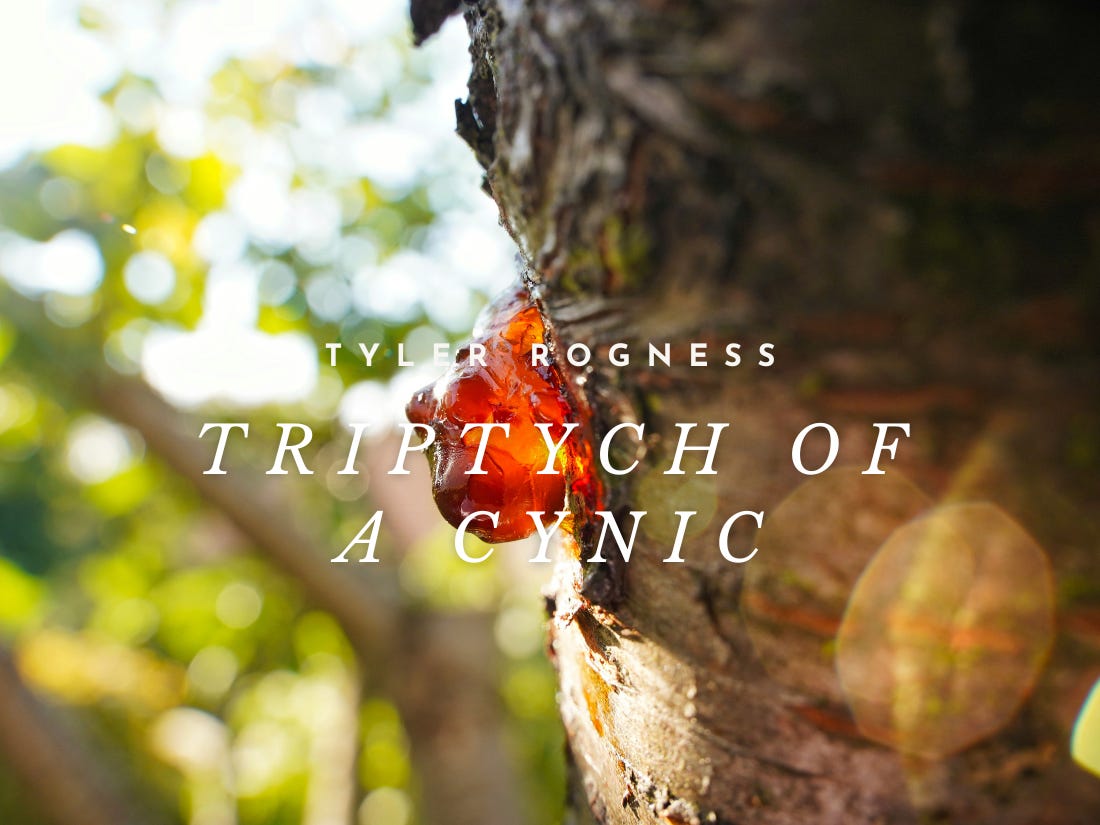Triptych of a Cynic
by Tyler Rogness
Part I. Holes
An accidental cynic encounters Christ.
So Christ comes
At the iron senseless time, comes
To force the glory into frozen veins:
His warmth wakes
Green life glazed in the pool, wakes
All calm and crystal trance with the living pains.
— Anne Ridler, from “Christmas and the Common Birth”
It’s supposed to be painless, bloodsharing. Warmth exits, but life returns — holiness forced back in. But what if the veins reject the glory? The needle of return is misplaced, and instead of life, what comes is black and blue and the deep rust-iron rud of death. Trust me, I wish for nothing more than to waken, but here I sleep: thrilled, but in the old way.
Postscript
Holy (adj.): Old English halig — “sacred, consecrated”; with a likely pre-Christian meaning of “whole” (which shares the OE root hal), “healthy” (also from hal), “not tainted.”
Thrill (v.): “to pierce, penetrate,” a metathesis of Old English þyrlian — “to perforate, pierce”; from þyrel — “hole.”
Part II. Crux
Behold the
holey God:
nothing to stanch or stem the messy flow,
no needle force-returns the holy spill.
Watch him
sink down
lifeless —
as stone;
Part III. Aroma
An accidental cynic addresses Christ over whiskey.
2 Corinthians 2:14-16 Your wake is the aroma of death to those who are dying. I attest, and I can feel it strong — sting sharp on the air. But the nose hints a sweetness beneath the shock. The palate is wood-rich; caramel and earth — deep as you are deep. I wonder, amber spirit, if the dying’s but transfiguring. Amber — yes, for the resin dies, but leaves the friction charged. Yours may be the aroma of death to the dying and to me, but sipping is sweet and the death a door. And you, yourself once passed this way. Life-water of mine, and thicket-fire, you can surely burn as bright in hearts of stone. Perhaps there’s hope of wholeness yet. Perhaps I am not so dead after all.
Postscript
Whiskey (n.): from Gaelic uisge beatha — “whisky” — a loan-translation of Medieval Latin aqua vitae, literally “water of life.” In the poet’s humble opinion, one can’t go wrong with a dram of a deep amber color.
Amber (n.): fossilized resin known for its remarkable ability to attract other substances to it when rubbed. Its Latin name electrum, preceding Modern English words and concepts for electricity, ultimately comes from a Greek root meaning “shining sun,” conceptually akin to its German name Bernstein: literally, “burning stone.”
Tyler Rogness is learning to sink into the small moments that fill a life. He loves deep words, old books, good stories, and his wonderful family who put up with his nonsense. His writing has appeared in Ekstasis Magazine, the Rabbit Room, the Habit Portfolio, and the Amethyst Review among other publications. More of his work can be found at awakingdragons.com.
Photo by Maximilian Müller on Unsplash






So good!
Love Part 2. And these lines especially of Part 3 stood out: "Yours may be the aroma of death to the dying
and to me, but sipping is sweet
and the death a door. And you, yourself once passed
this way."
Can tell there's a lot of layers and room for deep-diving in this poem - great job!
This is an astonishingly rich work. I’ve had the pleasure of reading it before, and with every reading I see more depths to plumb. Indeed, “…sipping is sweet / and the death a door.” Strong work, my friend!